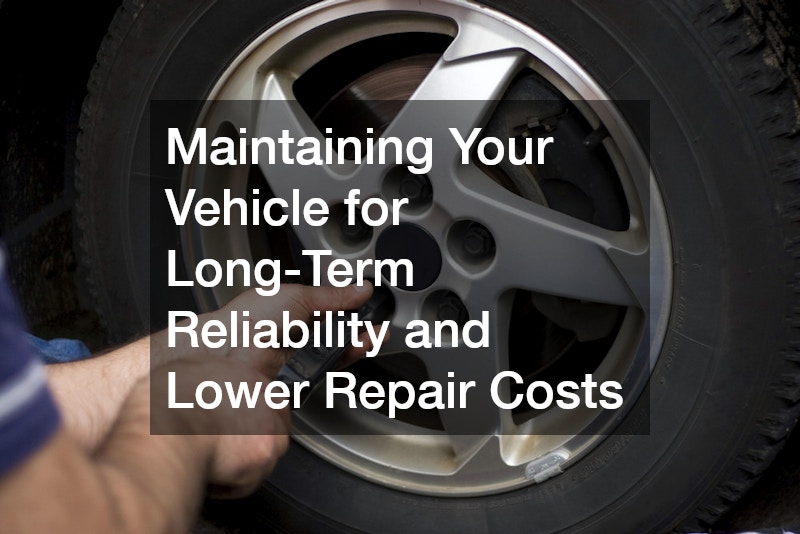Taking care of commercial trucks and specialty vehicles is not the same as looking after a personal car. These machines carry heavier loads, travel longer distances, and often work in tough environments every day. That constant strain means parts wear out faster, safety margins shrink quicker, and small issues can turn into big breakdowns if they are not caught early. A structured care plan helps you protect your investment, keep drivers safe, and stay on schedule.
Many fleets operate in industries where schedules are tight and margins are thin, such as regional delivery routes, construction hauling, and long-distance freight. In these settings, vehicles used for heavy trucking need to be ready to roll at all times. When you understand how load weights, road conditions, and driving patterns affect components, you can prioritize inspections where they matter most. That approach helps you focus maintenance dollars on the systems that keep the wheels turning.
Specialty vehicles also have unique stress points because of the jobs they perform. A dump truck that spends its days on rough job sites faces different wear than a box truck running highway routes. Hydraulic systems, lifting mechanisms, and reinforced frames may need targeted inspections beyond routine checks. When you build your maintenance routines around the real work each vehicle does, you are far more likely to catch problems before they interrupt service.
Building A Proactive Maintenance Plan
Good care starts with a written plan that covers inspections, service intervals, and how you will document repairs. Instead of waiting for warning lights or noises, schedule regular checks for fluids, filters, and safety equipment. A consistent routine makes it easier to spot patterns, such as certain parts wearing out faster than expected. Over time, those records help you compare operating costs and decide when it is smarter to repair or replace a vehicle.
Planning ahead is especially important for equipment that runs long distances or carries heavy loads. If your business depends on reliable semi truck repairs, you cannot afford to treat those jobs as last minute emergencies. Building in time for thorough inspections, software updates, and component testing reduces the risk of roadside breakdowns. The more you learn from past service history, the better you can schedule work before busy seasons.
A proactive plan also needs to account for how your routes and contracts evolve. As you increase loads, take on new territories, or shift operating hours, your maintenance schedule for heavy trucking may need to change. You might add extra inspections for vehicles on rough rural roads or long overnight hauls. Staying flexible with your plan allows you to protect vehicles as your business grows rather than letting new demands quietly shorten their lifespan.
Engine, Exhaust, And Performance Care
Engines are the heart of every work vehicle, and they depend on clean fluids and proper airflow to perform. Routine checks should include oil, coolant, filters, belts, and hoses, along with listening for unusual sounds or vibrations. Paying attention to emissions is just as important, because performance problems often show up in the exhaust first. When you keep a close eye on your truck muffler and related components, you can spot restrictions or leaks that might reduce power or cause violations.
Powertrain systems on larger units are under constant load, especially when you operate on steep grades, in hot climates, or with frequent stop and go driving. That is why many owners develop strong relationships with shops that focus on semi truck repairs. Skilled technicians can use diagnostic tools to catch performance issues in injectors, turbochargers, or fuel systems before drivers feel a loss of power. Addressing those problems early helps protect both fuel economy and engine longevity.
Beyond routine shop visits, you can support engine health by training drivers to report performance changes as soon as they notice them. A difference in acceleration, strange smoke, or increased fuel use may be the first sign of a deeper issue. When drivers understand that quick reporting helps keep them safe and reduces downtime, they become active partners in your maintenance program. That teamwork can make the difference between minor adjustments and major repairs.
Suspension, Steering, And Braking Safety
Comfortable, predictable handling is essential for vehicles that spend long hours on the road or job sites. Worn springs, bushings, and shocks can make a vehicle harder to control and more tiring to drive. Scheduling regular inspections and prompt truck suspension repair when problems appear keeps steering response consistent. It also helps tires wear evenly, which saves money and improves traction in wet or icy conditions.
Safety systems are at their best when every component is working together. When inspections turn up uneven tire wear, pulling to one side, or clunking noises over bumps, it is important to schedule timely truck suspension repair rather than hoping the symptoms fade. Addressing those concerns early can prevent extra strain on steering components and braking systems. Over time, that attention to detail supports safer handling for both drivers and everyone sharing the road with them.
Protecting Specialty And Rental Vehicles
Not every vehicle in your lineup is a daily workhorse that hauls freight or materials. Some units are used occasionally for special events, tours, or seasonal spikes in demand. Even when they spend more time parked than driving, vehicles used for party bus rentals still need consistent care. Their systems can suffer from sitting too long, especially batteries, tires, and interior materials. Regular checks and short exercise drives can keep them ready for the next booking.
Many operators also rely on short term or long term agreements to supplement their owned fleet. When you depend on a truck rental to cover busy periods or specialized jobs, you still need a plan for daily inspections and basic upkeep. Checking lights, fluid levels, and tire condition before every shift helps you spot concerns early and avoid disputes over damages. Treating these vehicles with the same care as your own units protects relationships with providers.
Special event and charter vehicles often operate in highly visible settings where appearance matters. That is another reason to keep up with inspections and cleaning routines for party bus rentals, even during slow seasons. A well maintained interior, functioning climate control, and smooth ride leave a lasting impression on passengers. By pairing consistent upkeep with detailed records, you can show customers that safety and comfort are central to your service.
Managing Heavy Fleet Operations And Logistics
Coordinating routes, loads, and driver schedules is just as important as turning wrenches. A well organized dispatch system helps you balance mileage across vehicles so that wear and tear stays fairly even. When you need to move equipment or vehicles between locations, professional truck transport can be a useful option. It allows you to relocate units without adding extra miles or driver fatigue, especially for long distances or unfamiliar routes.
Seasonal changes, new contracts, and unexpected breakdowns can all change how many vehicles you need on the road at once. Supplementing your lineup with a carefully chosen truck rental can smooth out these fluctuations. This strategy helps you meet demand without rushing maintenance or overloading your drivers. It also gives you time to make thoughtful decisions about long term fleet size instead of reacting under pressure.
Planning for growth means thinking ahead about how you will move vehicles when you open new branches, expand service areas, or sell older units. Working with a partner that offers reliable truck transport gives you flexibility in these situations. You can time moves to coincide with maintenance windows or driver availability, which keeps overall operations running smoothly. That extra planning helps protect both schedules and vehicle condition.
Keeping Your Work Sites Clean And Compliant
Commercial trucks and specialty vehicles are often surrounded by debris, packaging, and scrap materials at job sites. Loose waste can create safety hazards, damage tires, and attract pests if it is not handled correctly. Arranging for a roll off dumpster on larger projects can make it easier to keep staging areas clear. When everyone knows where to put waste, you spend less time moving piles around and more time focusing on productive work.
Construction, landscaping, and demolition work all place heavy demands on equipment that hauls and dumps materials. A well maintained dump truck can make repeated trips across rough ground without complaint, but only if it receives regular care. Checking hydraulic systems, tailgates, and bed linings helps prevent leaks and damage during daily use. Matching safe loading practices with consistent inspections keeps both the vehicle and your team protected.
Planning For Emergencies And The Unexpected
Even with the best maintenance plan, breakdowns and accidents can still happen. Preparing for these moments ahead of time can keep a bad day from becoming much worse. Establishing a relationship with a dependable tow truck service means your drivers know exactly who to call when they are stranded. That simple step reduces confusion, shortens response times, and can prevent secondary incidents near busy roads.
Weather, traffic, and road conditions can all add unpredictability to an already demanding job. When your drivers experience a breakdown, rollover, or collision, a quick call to your chosen tow truck service sets the recovery process in motion. Clear instructions about how to secure cargo, communicate location, and stay safe while waiting make these events easier to manage. Combining strong maintenance practices with solid emergency plans gives your fleet the resilience it needs.
Supporting Waste Handling And Shop Organization
Maintenance is not just about what happens on the road. Your shop should also be set up to handle used fluids, worn parts, and packaging waste efficiently. Working with a provider that can supply and service a roll off dumpster at your main facility keeps clutter under control. When bins are placed in convenient locations and emptied on a regular schedule, technicians spend less time walking around piles of trash and more time focusing on repairs.
Organized storage, labeled shelving, and clear floor markings all support faster, safer work in the shop. Technicians who know exactly where to find tools and parts can finish tasks without unnecessary delays. Good housekeeping also makes it easier to spot leaks, spills, or damaged components before they cause bigger problems. Over time, a well arranged shop becomes an important part of your overall maintenance strategy.
Focusing On Exhaust, Noise, And Comfort
Noise and fumes are more than just annoyances for drivers and nearby communities. Excessive exhaust, rattling, or vibration can signal deeper mechanical issues that need attention. Setting clear standards for how vehicles should sound and perform helps your team notice changes early. When you include inspection of the truck muffler in routine checks, you are more likely to catch cracks, loose hangers, or internal failures that affect both noise levels and emissions.
Cab comfort is also an important part of long term vehicle care. Seats, controls, and climate systems that work properly reduce driver fatigue and support better focus on the road. Regularly inspecting seals, vents, and interior components allows you to fix small problems before they become major complaints. When drivers feel that their comfort and safety are priorities, they are more likely to treat vehicles with care and report issues quickly.
Caring for commercial trucks and specialty vehicles is an ongoing commitment rather than a one time project. It calls for a combination of solid planning, disciplined follow through, and open communication among drivers, managers, and technicians. When you match scheduled maintenance with smart operations, you create a system that supports both reliability and safety. Over time, these habits help extend vehicle life and reduce unpleasant surprises on the road or job site.
The most successful fleets treat every inspection, repair, and training session as an investment in their future. By paying attention to how vehicles are used, where they show wear, and how drivers experience them, you can keep refining your approach. The result is a group of trucks, buses, and specialty units that support your business goals day after day. With a thoughtful strategy and consistent effort, your commercial vehicles can continue to deliver dependable service for many years.





